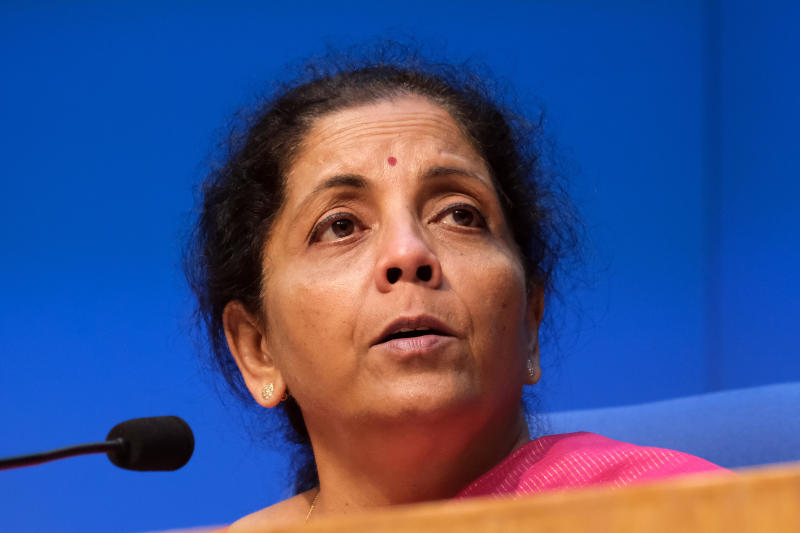Move to raise tax for India's super rich sparks debate
Sign up now: Get insights on Asia's fast-moving developments

India's Finance Minister Nirmala Sitharaman proposed a higher tax surcharge in her Budget speech on July 5, 2019.
PHOTO: BLOOMBERG
Follow topic:
NEW DELHI - Last week's announcement of a higher tax surcharge on India's super rich has sparked a debate between those who say it will discourage wealth creation and those who call it a necessary intervention to reduce the country's entrenched and growing inequity.
In her Budget speech last Friday (July 5), Finance Minister Nirmala Sitharaman proposed to raise the surcharge from 15 per cent to 25 per cent for those earning between 20 million and 50 million rupees (S$397,000 and S$992,700) a year and to 37 per cent for those earning more than 50 million rupees. This takes the effective tax rate for the two groups to 39 per cent and 42.74 per cent, respectively.
The surcharge, popularly known as a "Robin Hood" tax, will help fund the government's development spending.
Mumbai-based investor Harsh Gupta was among those who criticised the move, saying it will "hurt growth and not raise much revenue" in a Twitter post.
"The skilled are mobile in today's world, India is 4 per cent of global GDP, 40 per cent plus taxes not justified for our services," he added in his tweet.
Critics say the enhanced surcharge could push more wealthy Indians to emigrate to countries where they pay similar levels of income tax but get to enjoy a better living environment, unlike the polluted air and poor infrastructure in their own country.
India witnessed the third-highest outflow of wealthy individuals last year.
Nearly 5,000 millionaires, or high-net-worth individuals (HNWIs), left the country, making up 2 per cent of the total number of HNWIs in India, according to the Global Wealth Migration Review 2019 by AfrAsia Bank and research firm New World Wealth.
Some have urged the government to widen the ambit of tax-paying individuals instead of just raising taxes on the rich.
Taxes on the country's super rich have been increasing in recent years, with a surcharge of 10 per cent first imposed in 2013 on those earning more than 10 million rupees annually.
The country has around 84 million taxpayers, with many of the poor and those in the agricultural sector exempted from paying taxes. Those with an annual income of up to 500,000 rupees are also not required to pay any income tax.
Direct tax revenue for the government has increased by more than 78 per cent since fiscal 2013-14 to around 11.37 trillion rupees in 2018-19.
Those affected by the new surcharge make up only a small percentage of the country's 1.3 billion people.
The Economic Times newspaper reported that only around 0.16 per cent of those who filed tax returns in 2016-17 reported gross incomes between 10 million and 50 million rupees.
Mr Amitabh Behar, the chief executive officer of Oxfam India, described the additional tax burden as a "welcome but extremely inadequate step" in India's efforts to address the stark income and development inequity.
The international charity group, in a report earlier this year, said the fortune of India's billionaires had increased by 35 per cent in 2018 - or 22 billion rupees a day - while 136 million Indians who make up the poorest 10 per cent continued to remain in debt since 2004.
The report revealed that India added 18 new billionaires last year, raising the total number to 119. Their combined fortune surpassed the US$400 billion (S$544.84 billion) mark for the first time. It rose from US$325.5 billion in 2017 to US$440.1 billion in 2018, the single largest annual increase since the 2008 global financial crisis.
"Despite the growth that we have seen for the wealthy, we have a situation where we see the starvation of the public sector," Mr Behar told The Straits Times.
"In areas like education and healthcare, government spending has remained more or less stagnant at around 1.2 and 4 per cent of the GDP. In this context, I would have been far happier had we reintroduced inheritance and wealth tax too," he added.
Getting the richest 1 per cent in India to pay just 0.5 per cent extra tax on their wealth could raise enough money to increase government spending on health by 50 per cent, according to Oxfam India.
Those pushing for greater taxes on the super wealthy argue that India's recent decision is not an aberration but in keeping with what developed countries such as the United States and the United Kingdom are doing. Japan and Denmark have even higher tax rates on the super rich.
"These are societies affluent Indians aspire to be part of and whose public facilities and infrastructure they admire. Such development, however, is not possible in India unless the government can get the tax collection it needs," said Ms Sonu Iyer, a tax partner and national leader with EY India.
"It is about time that India's affluent begin to think about what it is that can make a difference. If a higher contribution makes that difference, one should be happy to make that contribution so long as down the road a general improvement starts to show in the economy," she told The Straits Times.
"And we have seen some change in India on this front. So, I am an optimist and I think we should give this proposal a chance to work," Ms Iyer added.

